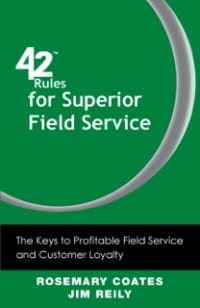What is the best way to find out what your customers want? Ask, of course. 
Field service organizations should not make assumptions about customers.
World-class field service organizations ask for feedback relentlessly. Marriott Corporation asks every guest every time ifeverything went well with their stay. On their web site, Marriott provides a place for written feedback that a guest might not want to deliver otherwise. They also provide a customer service feedback card that you can complete and mail back. These feedback collection methods help Marriott to continuously improve their service. The result? Marriott has the most loyal customers in the global hotel business by far.
We can certainly learn from Marriott’s relentless quest for customer feedback, but in the field service business, this is not enough. We also need to gather feedback and intelligence from our own internal departments, partners, and competitors to understand our true market position and the potential for improvement.
Don’t Wait to Ask For Feedback
Many companies will wait for a service failure or other event to survey the customer. While it’s important to get timely customer perceptions of service, during or just after an event, this should not be the only time you ask them to rate services if you are honestly looking to improve customer loyalty and satisfaction. This is because, besides the emotion that may be involved with a part failure, you may also be asking for money to perform the repairs. These things put the customer in a defensive position, and you are unlikely to get insightful information about your business.
 The best time to gather customer information regarding field service expectations is in the course of talking about new products. Field service managers can be helpful when assisting salespeople in describing the field service capabilities of the company. This may open up a whole new selling avenue and penetration of the customer organization.
The best time to gather customer information regarding field service expectations is in the course of talking about new products. Field service managers can be helpful when assisting salespeople in describing the field service capabilities of the company. This may open up a whole new selling avenue and penetration of the customer organization.
Excerpted exclusively for SmartVan from the new book, 42 Rules for Superior Field Service, by Rosemary Coates and Jim Reily.

Share this: